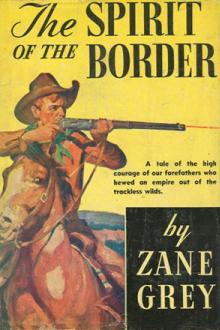The U. P. Trail, Zane Grey [robert munsch read aloud .txt] 📗

- Author: Zane Grey
Book online «The U. P. Trail, Zane Grey [robert munsch read aloud .txt] 📗». Author Zane Grey
Here the gully widened—sent off branches. Casey saw hundreds of horses—but not an Indian. He rolled swiftly on, crossed a bridge, and saw more horses. His grim anticipation became a reality. The Sioux were in the ambush. What depended on him and his luck! Casey’s red cheek blanched, but it was not with fear for himself. Not yet on this ride had he entertained one thought concerning his own personal relation to its fragile possibilities.
To know the Sioux were there made a tremendous difference. A dark and terrible sternness actuated Casey. He projected his soul into that clattering car of iron and wood. And it was certain he prayed. His hair stood straight up. There! the narrow cut in the hill! the curve of the track! He was pounding at it. The wheels shrieked. Looking up, he saw only the rocks and gray patches of brush and the bare streak of earth. No Indian showed.
His gaze strained to find an obstruction on the track. The car rode the curve on two wheels. It seemed alive. It entered the cut with hollow, screeching roar. The shade of the narrow place was gloomy. Here! It must happen! Casey’s heart never lifted its ponderous weight. Then, shooting round the curve, he saw an open track and bright sunlight beyond.
Above the roar of wheels sounded spatting reports of rifles. Casey forgot to dodge into his gravel shelter. He was living a strange, dragging moment—an age. Out shot the car into the light. Likewise Casey’s dark blankness of mind ended. His heart lifted with a mighty throb. There shone the gray endless slope, stretching out and down to the black hills in the distance. Shrill wild yells made Casey wheel. The hillside above the cut was colorful and spotted with moving objects. Indians! Puffs of white smoke arose. Casey felt the light impact of lead. Glancing bright streaks darted down. They were arrows. Two thudded into the gravel, one into the wood. Then something tugged at his shoulder. Another arrow! Suddenly the shaft was there in his sight, quivering in his flesh. It bit deep. With one wrench he tore it out and shook it aloft at the Sioux. “Oh bate yez dom’ Sooz!” he yelled, in fierce defiance. The long screeching clamor of baffled rage and the scattering volley of rifle-shots kept up until the car passed out of range.
Casey faced ahead. The Sioux were behind him. He had a free track. Far down the gray valley, where the rails disappeared, were low streaks of black smoke from a locomotive. The general’s train was coming.
The burden of worry and dread that had been Casey’s was now no more—vanished as if by magic. His job had not yet been completed, but he had won. He never glanced back at the Sioux. They had failed in their first effort at ambushing the cut, and Casey knew the troops would prevent a second attempt. Casey faced ahead. The whistle of wind filled his ears, the dry, sweet odor of the desert filled his nostrils. His car was on a straight track, rolling along down-grade, half a mile a minute. And Casey, believing he might do well to slow up gradually, lightly put on the brake. But it did not hold. He tried again. The brake had broken.
He stood at the wheel, his eyes clear now, watching ahead. The train down in the valley was miles away, not yet even a black dot in the gray. The smoke, however, began to lift.
Casey was suddenly struck by a vague sense that something was wrong with him.
“Phwat the hell!” he muttered. Then his mind, strangely absorbed, located the trouble. His pipe had gone out! Casey stooped in the hole he had made in the gravel, and there, knocking his pipe in his palm, he found the ashes cold. When had that ever happened before? Casey wagged his head. For his pipe to go cold and he not to know! Things were happening on the U. P. R. these days. Casey refilled his pipe, and, with the wind whistling over him, he relit it. He drew deep and long, stood up, grasped the wheel, and felt all his blood change.
“Me poipe goin’ cold—that wor funny!” soliloquized Casey.
The phenomenon appeared remarkable to him. Indeed, it stood alone. He measured the nature of this job by that forgetfulness. And memories thrilled him. With his eye clear on the track that split the gray expanse, with his whole being permeated by the soothing influence of smoke, with his task almost done, Casey experienced an unprecedented thing for him—he lived over past performances and found them vivid, thrilling, somehow sweet. Battles of the Civil War; the day he saved a flag; and, better, the night he saved Pat Shane, who had lived only to stop a damned Sioux bullet; many and many an adventure with McDermott, who, just a few minutes past, had watched him with round, shining eyes; and the fights he had seen and shared—all these things passed swiftly through Casey’s mind and filled him with a lofty and serene pride.
He was pleased with himself; more pleased with what McDermott would think. Casey’s boyhood did not return to him, but his mounting exhilaration and satisfaction were boyish. It was great to ride this way!... There! he saw a long, black dot down in the gray. The train!... General Lodge had once shaken hands with Casey.
Somebody had to do these things, since the U. P. R. must reach across to the Pacific. A day would come when a splendid passenger-train would glide smoothly down this easy grade where Casey jolted along on his gravel-car. The fact loomed large in the simplicity of the Irishman’s mind. He began to hum his favorite song. Facing westward, he saw the black dot grow into a long train. Likewise he saw the beauty of the red-gold sunset behind the hills. Casey gloried in the wildness of the scene—in the meaning of his ride—particularly in his loneliness. He seemed strangely alone there on that vast gray slope—a man and somehow accountable for all these things. He felt more than he understood. His long-tried nerves and courage and strength had never yielded this wonderful buoyancy and sense of loftiness. He was Casey—Casey who had let all the gang run for shelter from the Sioux while he had remained for one last and final drive at a railroad spike. But the cool, devil-may-care indifference, common to all his comrades as well as to himself, was not the strongest factor in the Casey of to-day. Up out of the rugged and dormant soul had burst the spirit of a race embodied in one man. Casey was his own audience, and the light upon him was the glory of the setting sun. A nightingale sang in his heart, and he realized that this was his hour. Here the bloody, hard years found their reward. Not that he had ever wanted one or thought of one, but it had come—out of the toil, the pain, the weariness. So his nerves tingled, his pulses beat, his veins glowed, his heart throbbed; and all the new, sweet, young sensations of a boy wildly reveling in the success of his first great venture, all the vague, strange, deep, complex emotions of a man who has become conscious of what he is giving to the world—these shook Casey by storm, and life had no more to give. He knew that, whatever he was, whatever this incomprehensible driving spirit in him, whatever his unknown relation to man and to duty, there had been given him in the peril just passed, in this wonderful ride,





Comments (0)